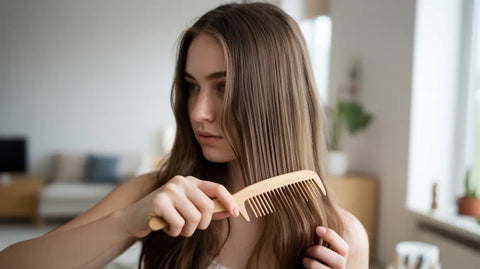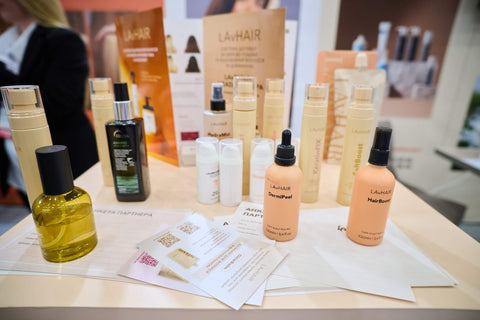Seasonal hair loss is a phenomenon familiar to many. Changes in temperature, humidity fluctuations, stress, and lower vitamin levels can all affect the condition of hair and scalp. It may be worrying, but most often this situation is the body’s natural reaction to seasonal change. While some hair loss is normal, excessive shedding in certain seasons can be concerning
Understanding the causes of seasonal hair loss and applying a comprehensive care routine not only helps reduce shedding but also supports overall hair health, texture, shine, and volume
Why does hair shed most intensely in autumn and spring?
To understand why hair loss increases during certain times of the year, it’s important to recall its life cycle. Each hair passes through three phases:
-
Anagen phase (growth phase) — lasts 2 to 7 years. Hair actively grows, nourished by follicles through blood vessels
-
Catagen phase (transition phase) — lasts 2–3 weeks. Growth slows, and follicles prepare for rest
-
Telogen phase (resting phase) — 3–4 months. Hair falls out, making way for new growth
When seasons change, especially from summer to autumn or winter to spring, more hairs enter the telogen phase simultaneously, which is why shedding intensifies. This is part of the natural cycle of adapting to changes in daylight, temperature, and humidity

Key causes of seasonal hair loss
-
Reduced vitamin and mineral levels
In autumn and winter, less sunlight reduces vitamin D synthesis. Deficiencies in iron, zinc, magnesium, and B vitamins, all crucial for follicle activity, are also common -
Climate and humidity changes
Cold air, indoor heating, and sudden temperature shifts dry out the scalp and hair, making it brittle and fragile -
Hormonal fluctuations
Seasonal changes affect cortisol and melatonin levels — hormones that indirectly influence hair condition -
Stress and fatigue
During stress, the body prioritises vital functions, slowing hair growth. A few months later, diffuse shedding often begins -
Aggressive cosmetic procedures
Frequent colouring, bleaching, perms, and heat styling without protection — especially in cold seasons — all increase brittleness and shedding
How to reduce shedding: a holistic approach
Masks or vitamins alone aren’t enough. Internal support and external care must be combined
Vitamins and nutrition
-
-
Vitamin D — stimulates follicle activity, especially vital in autumn and winter
-
B vitamins (B2, B5, B7/biotin) — support hair growth and density
-
Iron — deficiency often triggers diffuse shedding
-
Zinc and magnesium — essential for cell division and new hair formation
-
Omega-3 fatty acids — hydrate the scalp from within, reducing dryness and flaking
-
A balanced diet with eggs, fish, leafy greens, nuts, seeds, legumes, and lean meat supplies hair with building blocks
Stress reduction
Exercise, walking, meditation, and proper sleep lower cortisol and stabilise the growth cycle

Gentle hair care
-
-
Avoid washing with very hot water
-
Use brushes with natural bristles or wide-tooth combs
-
Always apply heat protection before drying or styling
-
Minimise chemical treatments during shedding periods
-
How professional products help stop seasonal shedding and reduce its intensity?
Along with healthy habits, targeted care that works directly on follicles, scalp, and hair structure is essential. Among the most effective solutions are LAvHAIR products, designed to strengthen and restore hair:
-
HairBoost — scalp serum
Formulated with active ingredients that nourish the scalp, boost microcirculation, and strengthen follicles. With regular use, shedding decreases within 3–4 weeks, new growth is stimulated, and density returns -
DermiPeel — scalp peel
Cleansing the scalp is vital but often overlooked. DermiPeel gently removes dead skin cells, unclogs pores, and boosts circulation, improving the absorption of nutrients and follicle activity -
Masks and shampoos for deep repair
LAvHAIR masks and shampoos, such as the RepairPro line, restore elasticity and shine, reduce breakage and dryness, and help preserve length and thickness even during shedding periods
Seasonal hair loss is natural, but it can be managed. The best strategy combines at-home care, professional salon treatments, and a healthy lifestyle
The most effective approach:
-
balanced nutrition and vitamin support,
-
stress reduction and a mindful daily routine,
-
regular scalp and hair care,
-
specialised products such as HairBoost, DermiPeel, LAvHAIR masks and shampoos;
This approach will help keep your hair strong, full, and shiny all year round!


